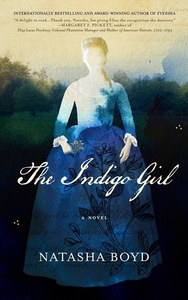You need to sign in or sign up before continuing.
Take a photo of a barcode or cover
Virtual Mount TBR 2022: book # 15
This was a good audiobook! I enjoyed listening and was pleasantly surprised when I found out it was based on a true story.
This was a good audiobook! I enjoyed listening and was pleasantly surprised when I found out it was based on a true story.
inspiring
medium-paced
Learning about South Carolina history before our visit.
This book was certainly a slow starter. It didn't get interesting until around page 170 and the character development felt a little lacking in depth. Additionally, it was fairly predictable and some plot points didn't feel true to the characters' nature. Given the historical foundation, but also the acknowledged dearth of awareness for Eliza Lucas Pinckney, opening the novel with a prologue that named her as Charles' future wife felt disingenuous. Eliza's understanding of and approach to slavery seemed to change on a dime, without enough experience to support her growing feeling of disgust. Though there were parts I thoroughly enjoyed (each time Eliza turned down a potential suitor, for example), there was not enough foundation in her character development, as stated earlier, for some of her actions to make sense.
Thought this was such a good book and the fact that it is based on a real woman is amazing. If you like southern historical fiction then this book is for you.
challenging
emotional
hopeful
informative
inspiring
reflective
sad
medium-paced
Really loved this book. Great listen and very interesting subject/person in history I had never heard of. If you like historical fiction with strong female protagonists, this is a great one.
Interesting historical novel that is easy to read. Enjoyed it.
The most amazing part of this book is that it is mostly fact. Multiple times I felt like it was a delightful piece of romanticized fiction, yet the story was, as Natasha Boyd states in her end note, "based on true events and historical documents."
At the young age of 17, Eliza Lucas Pinckney took over the management of her family's plantations in South Carolina while her father returned to Antiqua in his quest to be the colonial governor. Eliza's two brothers, both younger than her, were off being schooled in England; her mother, who disapproved of most of Eliza's initiatives, and younger sister remained with her in South Carolina.
During Eliza's time the standard life for a young girl was to find a husband. Eliza was intelligent, forward thinking, an early riser who made full use of her day, an avid reader on many topics including botany, and an entrepreneur, which is why her father entrusted her to oversee his plantations until such time as her brother was old enough to take her place. Eliza set out to prove her father's faith in her, and in the process she saved his estate and found a way to turn a profit not just for him but for South Carolina through the laborious art of growing and harvesting indigo for making dye.
Along the way she taught her slaves to read, believed in setting them free - which she eventually did - and, despite her mother's sense that it would never happen, managed to meet someone who appreciated her for who she was, fall in love and marry.
I refer you to this article for a quick overview of her life. As with my previously read book, American Eden: David Hosack, Botany, and Medicine in the Garden of the Early Republic, this is an example of how history can be made to come alive!
At the young age of 17, Eliza Lucas Pinckney took over the management of her family's plantations in South Carolina while her father returned to Antiqua in his quest to be the colonial governor. Eliza's two brothers, both younger than her, were off being schooled in England; her mother, who disapproved of most of Eliza's initiatives, and younger sister remained with her in South Carolina.
During Eliza's time the standard life for a young girl was to find a husband. Eliza was intelligent, forward thinking, an early riser who made full use of her day, an avid reader on many topics including botany, and an entrepreneur, which is why her father entrusted her to oversee his plantations until such time as her brother was old enough to take her place. Eliza set out to prove her father's faith in her, and in the process she saved his estate and found a way to turn a profit not just for him but for South Carolina through the laborious art of growing and harvesting indigo for making dye.
Along the way she taught her slaves to read, believed in setting them free - which she eventually did - and, despite her mother's sense that it would never happen, managed to meet someone who appreciated her for who she was, fall in love and marry.
I refer you to this article for a quick overview of her life. As with my previously read book, American Eden: David Hosack, Botany, and Medicine in the Garden of the Early Republic, this is an example of how history can be made to come alive!
emotional
informative
reflective
medium-paced
Plot or Character Driven:
Character
Strong character development:
Yes
Loveable characters:
Yes
Diverse cast of characters:
Yes
Fascinating history.



